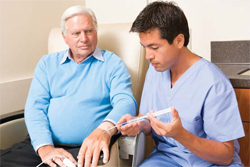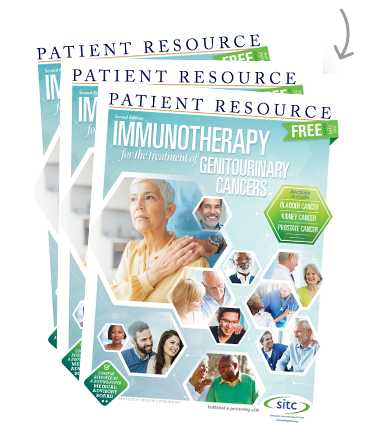Advanced Prostate Cancer
Chemotherapy

Chemotherapy is the use of a cancer-killing drug (or a combination of drugs) to shrink the tumor and limit the survival of cancer cells. Given in cycles of treatment followed by a recovery period (no chemotherapy), it is usually given intravenously (through a vein) but may also be given in pill form (although oral drugs may be more expensive with greater patient responsibility).
Chemotherapy is usually not given until ADT has stopped working, when the cancer has become “castration-resistant” prostate cancer. However, a 2014 study found that the combination of chemotherapy plus ADT in men with advanced prostate cancer resulted in improved outcomes. You should discuss this treatment plan with your physician.
Side effects
Chemotherapy drugs kill rapidly growing cancer cells but can harm other cells in the body that also divide rapidly. So while chemotherapy may reduce the pain of metastatic cancer and prolong life, it also may cause significant side effects that affect your quality of life. The side effects depend on the drug and how long it’s given, but the most common include:
- Hair loss
- Fluid retention (leading to foot and leg swelling)
- Mouth sores
- Weakness
- Neuropathy (pain or tingling in feet/hands)
- Nausea, vomiting and diarrhea
While most of these side effects go away when chemotherapy stops, your doctor can suggest medications that may help prevent some side effects or make them less bothersome. More information on managing treatment-related side effects can be found here.
Monitoring response
As with ADT, monitoring your PSA level is one way to see how well chemotherapy is working. Other blood tests, a physical examination and imaging studies provide a more complete picture of how your prostate cancer is responding to treatment.
Questions about chemotherapy you may want to ask your doctor
- What are the benefits of chemotherapy for me?
- How long would chemotherapy last?
- What are the risks and benefits of chemotherapy?
- Are there treatment options if chemotherapy fails?
- How does chemotherapy work?
- Which drug or drugs will I receive? When will the treatment start and how long will it take?
- What side effects can I expect and how can they be treated?
- How long will the side effects last?
- How will my daily activities be affected?
- How often should I have check-ups after my treatment?
- How will my treatment affect my sexual well-being and fertility?
- What is the cost of my treatment and will insurance cover it?
- Is there a clinical trial that I may be eligible for?



